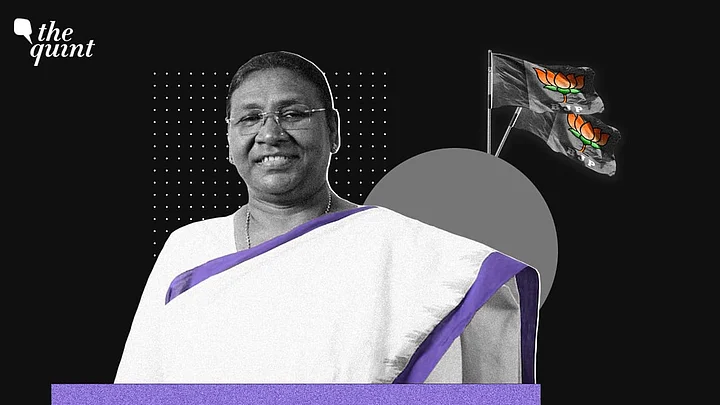Droupadi Murmu is on the cusp of becoming the first tribal woman to be the President of India. But how has her nomination by the Bharatiya Janata Party-led National Democratic Alliance (NDA) been received by India's tribal and adivasi leaders?
For many, it is good news, but for others she is "nothing more than a symbolic representation of the tribal people" – and "a distraction from the anti-tribal policies of the Central government".
Gladson Dungdung, a tribal activist in Jharkhand, expressed his doubt over a phone call to The Quint.
Murmu hails from Odisha’s Mayurbhanj district and started her career as a teacher and later joined politics. She later became the first woman governor of Jharkhand in 2015.
Dungdung alleged that Murmu didn't do anything for the people of Pathalgadi which was revived to protest tribal land rights in May 2016.
“The BJP government is using Murmu to gain votes and make changes to the laws safeguarding land and forest rights of the tribal people. She did nothing for the people of Pathalgadi, nothing when tenancy laws were being amended, and it took her months to strike them down. There's a very good chance that the BJP will use her in the president's office the same way and would point to her if anybody asks questions on anti-tribal policies. Because at the end, a tribal president would have approved these policies.”Gladson Dungdung
Less Hope, More Anxiety, Say Tribals
Former President of the Chhattisgarh Sarv Adivasi Samaj, BPS Netam, who is also a retired IAS officer, said the exhilaration of the news has been overshadowed by genuine concern.
"Yes, we are happy that someone from the tribal community, especially a woman, would be the country's President. But the last President (Ram Nath Kovind) was also from a Scheduled Caste, and yet there is no visible upliftment of their community.BPS Netam
Reaffirming Netam's concerns, Soni Sori, a tribal activist from Bastar in Chhattisgarh, said that adivasis have always been subjected to manipulations.
Sori then questioned Murmu's silence on tribal matters, especially the latest Supreme Court judgment denying request for an inquiry into the alleged 2009 encounter which took place in Sukma's Gompada, where 16 adivasis, who the security forces claimed were Maoists, were gunned down.
"These are few of the many questions which linger in our minds while we talk of a tribal woman becoming the President,” Soni added.
BJP Continues Its Tribal Outreach Programme, Efforts To Strengthen the Tribal Base
However, for the BJP, which has over the last few years shifted its focus towards giving more space to those from the marginalised communities, nominating Murmu is another step towards strengthening its widening social base.
In Madhya Pradesh, where Union Home Minister Amit Shah visited twice within seven months between October 2021 and April 2022, the BJP is pushing hard to regain the support of the tribal communities.
The BJP could only win 16 of 47 seats reserved for Schedule Tribe in the 2018 Assembly elections as against 31 seats in 2013 elections.
In Chhattisgarh and Jharkhand, the BJP is attempting to re-establish its hold among tribal-dwellers, however much hasn’t happened since the regime change in the two states in 2018 and 2019, respectively.
Litu Minz, who comes from a mining-affected family in Odisha's Sundargarh, is currently fighting against the expansion of a cement plant which the locals claim will be a deterrent to tribal lives and settlements.
Minz told The Quint that not all who get access to better life and power work for the betterment of their families, communities, and the country.
In neighbouring Jharkhand, Bandhan Tigga, a dharmaguru (religious leader) of the Sarna tribes (people who follow the Sarna code of belief which involves worshipping nature), echoed Minz.
“Everywhere in India, tribals are being forced out of their homes, attempts are being made to weaken the institutions protecting tribal rights, and legislations are being amended.”Litu Minz
Tagga added that the hope is that she will cater to each and every Indians – and not just those who the BJP considers to be Indian.
“It will become very difficult if people of my own community start taking sides of those forcing tribals out of their homes. If tomorrow some anti-tribal law is passed or our rights protected under Schedule V and VI are violated by weakening the law, where will we go? If Murmu becomes a part of this anti-tribal drive, who would we turn to?” Minz questioned.
During the BJP’s Raghubar Das-led government in Jharkhand, Chota Nagpur Tenancy (1908) and Santhal Parganas Tenancy (1949) Acts, popularly known as the twin tenancy acts, were amended in November 2016. The amendment empowered the state government to use agricultural land for non-agricultural purposes.
The amendment bill was later turned down by Murmu, the then Jharkhand governor, under heavy pressure from tribal protesters. But before that, thousands of tribals were arrested and put behind bars for the protest against amendments.
“Though the amendments were not approved, it happened months later, and by then thousands were arrested, charged under stringent sections of sedition law, and Murmu’s prolonged silence during this period is a constant reminder to the people about how political pressure silences even a governor,” said a journalist from Jharkhand who did not wish to be named.
(At The Quint, we question everything. Play an active role in shaping our journalism by becoming a member today.)
